Lawn & Garden Retailer Headlines
2005 Retail Forecast
The National Retail Federation (NRF) recently revised its 2005 sales forecast based on the inclusion of new merchandise categories (food and beverage stores, building materials and garden equipment stores, health and personal care stores, and miscellaneous retailers including florists and gift shops). Additionally, NRF has predicted that retail industry sales (which exclude motor vehicles, gas stations and restaurants) will increase 4.8 percent from last year. In its quarterly Retail Sales Outlook Report, NRF cites tough comparisons and a slowing economy as contributors to weaker growth than last year. Retail industry sales grew 7.0 percent in 2004, the highest growth since 1999.
“The indomitable consumer has kept on spending in spite of high levels of debt and extremely low savings, but this pace cannot continue much longer,” said NRF Chief Economist Rosalind Wells. “In addition to tough comparisons, which will plague the retail industry for most of the year, consumers will be stretched thin from rising interest rates, high energy prices and modest gains in employment and income.”
One bright light in the economy appears to be in business investments, which have increased substantially. Many companies, experiencing healthy profits and high levels of cash flow, are making large productivity-enhancing investments. NRF expects business capital spending to continue to rise this year.
According to the Retail Sales Outlook, several retail categories are poised for strong growth in 2005, including building materials and garden equipment stores, luxury retailers, warehouse clubs and electronic shopping. Retailers who may be particularly challenged include discounters, whose shoppers will be most affected by higher gas prices, and department stores, who are still struggling to define themselves.
NRF also expects that sales of furniture and home furnishings, which have experienced very strong growth in the last few years, will start to soften as mortgage rates rise and housing becomes less affordable.
First-quarter retail industry sales increased 5.4 percent. NRF’s forecast for the remainder of the year is to see gains of 5.0 percent in both the second and third quarters and a gain of 4.1 percent in the fourth quarter.
Smith, Central Garden & Pet Partner
Central Garden & Pet Company announced recently that it formed an exclusive relationship with gardening expert P. Allen Smith. Timed to coincide with the release of Smith’s latest book, P. Allen Smith’s Container Gardens, the relationship is designed to extend the awareness of the growing trend of outdoor lifestyles, particularly container gardening.
P. Allen Smith hosts a nationally syndicated gardening series, “P. Allen Smith Gardens” and a PBS series called “P. Allen Smith’s Garden Home.” He makes frequent appearances on The Weather Channel, NBC’s Today Show and is featured in numerous garden-related and women’s magazines, such as Cottage Living and Woman’s Day. Currently, Smith is on a nationwide tour promoting his book, which features several Norcal Pottery and New England Pottery designs.
“I have admired both Norcal Pottery and New England Pottery’s outstanding quality and designs for many years,” commented Smith. “Their dedication to innovative colors and textures coincides with my mission of helping people create beautiful outdoor living spaces, blurring the lines between the indoors and the outdoors and creating joyful spaces for living.”
Central Garden & Pet Company is a marketer and producer of quality branded products for the pet and lawn and garden markets. Its pet products include pet bird and small animal food; aquarium products; flea, tick, mosquito and other pest control products; edible bones; cages; carriers; pet books; and other dog, cat, reptile and small animal products. These products are sold under a number of brand names, including Kaytee, All-Glass Aquarium, Oceanic, Kent Marine, Energy Savers Unlimited, Zodiac, Pre-Strike, Altosid, Nylabone, TFH, Four Paws and Interpet. Their lawn and garden products include grass seed, wild bird food, weed and insect control products, decorative outdoor patio products and ant control products. These products are sold under a number of brand names, including Pennington, Norcal Pottery, New England Pottery, GKI/Bethlehem Lighting, Lilly Miller, Matthews Four Seasons, AMDRO, Grant’s, Sevin and Over’n Out.
Eastern Performance Trials
From Monday, Sept. 19 to Saturday, Sept. 24, 2005 a number of industry breeder/marketer companies will present their best 2006 plants for review at six locations across the eastern seaboard during the first-ever Eastern Performance Trials, brought to you by Garden Centers of America (GCA). With the trials just a few months away, many lawn and garden retailers are wondering what they can expect to gain from this event.
“Never has there been an industry event where such a broad scope of plant material is displayed at one location,” said GCA trial committee chairman, Don Riddle. “As a garden retailer myself, I’m excited about previewing all of the best new introductions top breeders and growers have to offer for 2006 and seeing the plants in retail displays and garden settings.” GCA officials say that the assortment of plants will include flowers, vines, shrubs, trees, foliage and perennials all available through a number of companies (see sidebar, right, for list).
Attendees, according to Riddle, can also expect to learn a lot about predicted garden and merchandising trends while at the trials. “Each host location will feature the plants in inspirational gardens and in a more traditional merchandising format,” he said. “Retailers will see not only how the plants can be merchandised in their stores but also how they will be incorporated into their customers’ landscapes.”
What’s most exciting, according to Tim Kane from Prides Corner Farms, Lebanon, Conn., a participating vendor company, is the experience retailers will get from attending the event. “Many times, retailers are too close to their business. They need an event like this to gain a new perspective and recharge their company’s batteries.”
The GCA says that while the trials offer an excellent opportunity for retailers to preview new introductions, the event will achieve one other objective existing shows have not. “The trials will close the marketing loop between garden center retailers and their consumers,” said Clint Albin, project manager for the Eastern Performance Trials.
Albin says that the GCA is working overtime to get the word out about each company’s best plants to the trade and consumer media simultaneously. “By creating excitement for the 2006 introductions amongst home gardeners in September, we hope to help drive sales for these plants in garden centers next spring.”
Like the California Pack Trials, attendees must provide their own transportation and can travel from site to site at their leisure. For more information, visit www.eastern performancetrials.org.
AgJOBS and H2B Update
AgJOBS
On Tuesday, April 19, 2005 the U.S. Senate took two procedural votes on competing measures to deal with the agricultural labor crisis. If a “supermajority” of 60 senators had voted to invoke “cloture” on either measure, the Senate would have proceeded with full consideration of the bills as amendments to the Iraq supplemental spending bill.
One of the amendments was S.359, the Agricultural Job Opportunity, Benefits, and Security Act of 2005, or AgJOBS, authored by Sen. Larry Craig (R-ID). AgJOBS attracted a majority of the Senate on a 53 to 45 vote. A competing proposal offered by Sen. Saxby Chambliss (R-GA) and Jon Kyl (R-AZ) was rejected by the Senate on a vote of 21 to 77.
“We consider the AgJOBS vote extraordinary,” said Luawanna Hallstrom, CEO of the nation’s largest vine-ripe tomato producer and co-chair of the Agriculture Coalition for Á Immigration Reform (ACIR). “The vote demonstrates that AgJOBS has majority support in the U.S. Senate. We know that several strong supporters decided that the military spending bill should not be used as a vehicle for immigration reform; we’ll have their votes in the future” Hallstrom added.
The Senate vote was widely seen as an affirmation that the contentious immigration issue will only be resolved with bipartisanship and dialogue. The Chambliss/Kyl bill, offered at the last minute without widespread industry input, garnered only 21 of the 60 votes needed. “The bill has many features in its H-2A provisions that would be welcomed by AgJOBS supporters,” said John Young, president of the New England Apple Council and ACIR co-chair. “Yet, just like similar bills in the House in the late 1990s, the bill became partisan and lost a number of Republicans and almost all Democrats.” The Chambliss bill had limited support from national agricultural groups. “A unified agricultural industry is vitally important to this effort, and a perfect solution is the enemy of a good solution,” Young added.
AgJOBS’ legislative champion, Craig, reflected on the situation: “A majority of my colleagues sent a strong message today that they support AgJOBS and are ready to address immigration reform. President Bush and Majority Leader Frist continue to stress the importance of addressing comprehensive immigration reform this year. I will continue to work with Senator Kennedy and our other supporters to bring this before the Senate sooner rather than later.”
H-2B
Also on April 19, the American Nursery and Landscape Association (ANLA) announced the vote providing H-2B employers continued access to much needed foreign workers. The Save Our Small and Seasonal Businesses Act, sponsored by Sen. Barbara Mikulski (D-MD) and endorsed by ANLA, was attached to the emergency supplemental spending bill funding the war and rebuilding in Iraq and Afghanistan.
“The overwhelming support shown by the Senate was a testimony to the power of a unified small business community,” stated John Meredith, ANLA’s director of legislative relations. Green industry lobbying efforts by ANLA, PLANET and other groups were carefully orchestrated to send a consistent and strong message. “Passing 94 to six against the wishes of the majority leadership is simply phenomenal.”
The H-2B program limits businesses’ access to temporary seasonal foreign labor by capping visas at 66,000. This limit threatens many small businesses, including landscape firms, with a shortage of labor and inability to operate this year. The Save Our Small and Seasonal Businesses Act would exempt workers who had participated in
the H-2B program over the past three years from being counted toward the cap for the next two years, allowing their employers access to the trained and trusted workers they have become dependent on meeting their seasonal needs.
The H-2B vote succeeded amidst consideration of several other immigration proposals, including the ANLA-supported AgJOBS bill. “The unified green industry push for immigration and labor reform helped to set up the win on H-2B,” said Craig Regelbrugge, ANLA’s senior director of government relations. “ANLA members and state grassroots partners have invested heavily in educating the industry, and supporting the campaigns of business-friendly senators and representatives. While the Senate was not ready to face up to days of difficult debate over the broader reforms included in the AgJOBS bill, most senators know there’s a problem to solve. AgJOBS helped to create a wave, and H-2B was able to ride to victory on that wave. We’re very pleased with the initial win and overall progress,” Regelbrugge added.
The H-2B Workforce Coalition, co-chaired by ANLA and the National Restaurant Association (NRA), is the business community group that coordinated support for the legislation.
Spending Tops $6 billion
American households spent an estimated $6.1 billion on flowers and plants in 2004, an increase of 2.3 percent over 2003, according Á to Ipsos, a leading survey-based marketing research company.
The Ipsos/AFE Consumer Tracking Study (now in its 12th year) also shows that the floriculture industry continues to have difficulty finding new customers, with fewer households buying floral products over a 12-month period. Although the total number of households that purchased flowers and plants held steady during 2004 reaching 63 million U.S. households the industry did not keep pace with population growth, the Ipsos study showed.
“2004 was spotty for the floral industry,” said Barrie Rappaport, a floriculture industry analyst with Ipsos in Chicago. “Consumer spending increased from 2003, but overall demand slipped. The industry has had difficulty retaining its customer base over the past few years but may finally be starting to dig out, as the buyer count in 2004 held at the 2003 level. In particular, flower and plant customers purchased slightly less often than they did last year, perhaps a result of increased spending on a per-product basis, more than the rate of inflation (4-plus percent).”
“The profits growers and retailers share are derived from what consumers spend for flowers and plants and continue to be squeezed. It was this perceived lift in the average price paid by consumers for floral products among the existing customer base that was the source of the industry’s dollar growth in 2004. Future growth depends on maintaining and maximizing purchasing among the existing core floral buyer group and at the same time, developing appropriate strategies to attract the infrequent or non-floral buyer.”
Bachman’s Opens Largest Store
Bachman’s has opened its largest garden and landscape center to-date in May 2005. The new concept, called Cedar Acres, is located in Farmington, Minn. Situated on Bachman’s 629-acre growing range, Cedar Acres will have the broadest line of nursery, landscape and hardgoods products in the Twin Cities market, according to Dale Bachman, president of Bachman’s.
Bachman’s Cedar Acres is geared toward the garden and landscape customer who is either a “do-it-yourselfer” or is working with a landscape designer and wants to personally select their trees, plants, shrubs and hardgoods. Three horticulturists and an in-store landscape designer are on staff.
Cedar Acres will serve the greater Twin Cities metro area, as well as communities such as Northfield, Owatonna, Faribault, New Prague, Shakopee, Cannon Falls, Savage and Prior Lake. During its first year of operation, Cedar Acres will be open seven days a week from May through late October
The new center will sell the full range of products Bachman’s produces, including trees, evergreens, shrubs and greenhouse crops such as blooming plants, annuals, perennials and seasonal favorites.
Cedar Acres, with its vast interior and exterior space, will showcase Bachman’s complete offering, including container-grown and balled and burlapped trees, in a huge selection of varieties and sizes. A full selection of sun and shade annual and perennial plant varieties in all sizes will be featured both outside and inside a 10,360-sq.ft. greenhouse with state-of-the-art “open sky” computer-controlled technology. Also offered will be a large assortment of shrub roses, hybrid roses, vines, groundcovers, bulbs, seeds and sod.
Throughout the 14-acre Cedar Acres site, giant display gardens will showcase ideas for planting trees and shrubs for landscapes and perennial and annual gardens, in both sun and shade. Water gardens, including a unique waterfall, will offer dramatic and unique outdoor ideas. Cedar Acres will also feature a golf putting green where customers may “take a break and practice their short game!” quipped Bachman. Cedar Acres will employ approximately 50 full- and part-time employees.






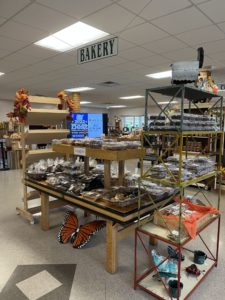


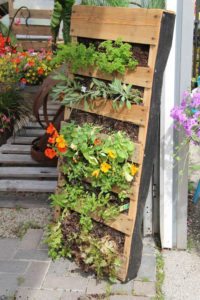
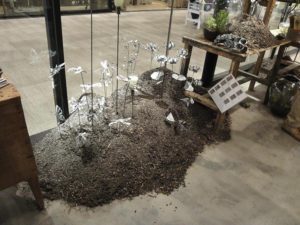
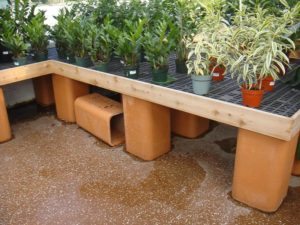

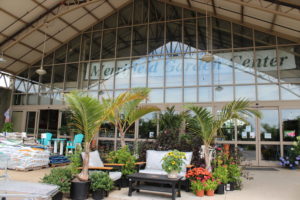



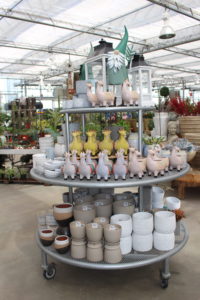
 Videos
Videos





